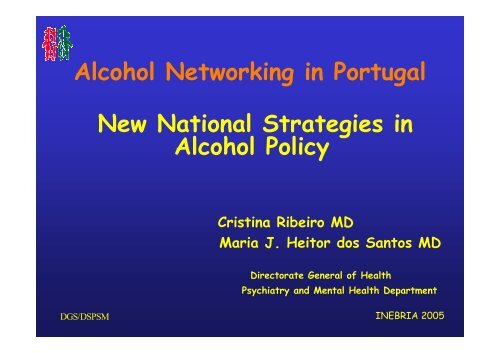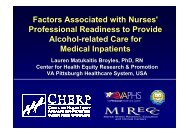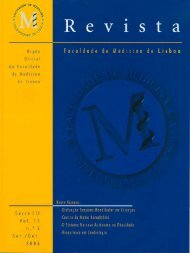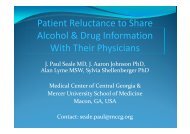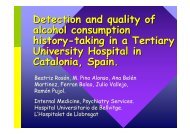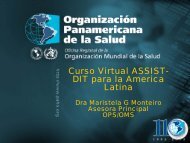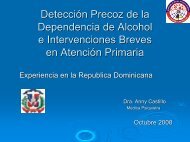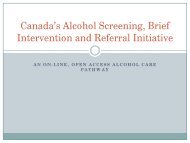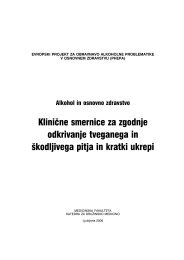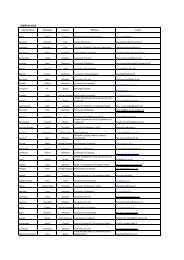Dr. Cristina Ribeiro - INEBRIA
Dr. Cristina Ribeiro - INEBRIA
Dr. Cristina Ribeiro - INEBRIA
You also want an ePaper? Increase the reach of your titles
YUMPU automatically turns print PDFs into web optimized ePapers that Google loves.
Alcohol Networking in Portugal<br />
New National Strategies in<br />
Alcohol Policy<br />
<strong>Cristina</strong> <strong>Ribeiro</strong> MD<br />
Maria J. Heitor dos Santos MD<br />
Directorate General of Health<br />
Psychiatry and Mental Health Department<br />
DGS/DSPSM <strong>INEBRIA</strong> 2005
Alcohol Networking in Portugal<br />
Summary<br />
I – Alcohol consumption in Portugal<br />
II- Evolution of Alcohol Policy in<br />
Portugal<br />
III- New National Strategies in Alcohol<br />
Policy<br />
DGS/DSPSM <strong>INEBRIA</strong> 2005
Alcohol Networking in Portugal<br />
I-Alcohol consumption in Portugal<br />
14<br />
12<br />
10<br />
Álcohol consumption in the world- 2002Fonte: World <strong>Dr</strong>ink Trends 2004<br />
11,9 11,1<br />
10,8 10,8 10,4 10,3<br />
9,7 9,6 9,6 9,5<br />
9,2 9,1<br />
8<br />
6<br />
4<br />
2<br />
0<br />
Luxemb<br />
Hungria<br />
Rep Irlanda<br />
Rep Checa<br />
Alemanha<br />
França<br />
Portugal<br />
Espanha<br />
Reino Unido<br />
Dinamarca<br />
Austria<br />
Chipre<br />
DGS/DSPSM<br />
<strong>INEBRIA</strong> 2005<br />
L (álcool puro)
Alcohol Networking in Portugal<br />
I-Alcohol consumption in Portugal<br />
120<br />
100<br />
80<br />
Liters<br />
60<br />
40<br />
20<br />
0<br />
61<br />
63<br />
65<br />
67<br />
69<br />
71<br />
73<br />
75<br />
77<br />
79<br />
81<br />
83<br />
85<br />
87<br />
89<br />
91<br />
93<br />
95<br />
97<br />
99<br />
2001<br />
Beer Wine Total<br />
DGS/DSPSM <strong>INEBRIA</strong> 2005
Alcohol Networking in Portugal<br />
I-Alcohol consumption in Portugal<br />
Excessive Consumption<br />
Dependent drinkers<br />
Persons with problems<br />
directly related with<br />
alcohol<br />
Aires Gameiro, 1998<br />
9,4%<br />
7,4%<br />
16,6%<br />
756.000<br />
580.000<br />
1.336.000<br />
DGS/DSPSM <strong>INEBRIA</strong> 2005
Alcohol Networking in Portugal<br />
I-Alcohol consumption in Portugal<br />
Alcoholic Beverages Consumption Habits in Portugal<br />
1980 interviews<br />
Population > 15 years old<br />
Living in Continental Portugal<br />
Source: National Heath Inquiry 1999<br />
DGS/DSPSM <strong>INEBRIA</strong> 2005
Alcohol Networking in Portugal<br />
I-Alcohol consumption in Portugal<br />
The prevalence of consumers of alcoholic<br />
beverages was 59,4% of the population<br />
• in men (82,2%)<br />
• in women (45,8%) in every age group<br />
• increasing with age until 35 years old<br />
in both genders.<br />
DGS/DSPSM <strong>INEBRIA</strong> 2005
Alcohol Networking in Portugal<br />
I-Alcohol consumption in Portugal<br />
• The average consumption of ethanol is<br />
higher in the male gender (47,3gr)<br />
than in female (17,1gr);<br />
• and even higher between 35 and 44<br />
years old, in both genders.<br />
DGS/DSPSM <strong>INEBRIA</strong> 2005
Alcohol Networking in Portugal<br />
I-Alcohol consumption in Portugal<br />
• In the female gender there is a slight<br />
increase in the country with a strong<br />
increase in Alentejo and Algarve<br />
• 35% of the youngsters from 15 to 17<br />
years old declared they have drank<br />
the year before the interview<br />
DGS/DSPSM <strong>INEBRIA</strong> 2005
Alcohol Networking in Portugal<br />
I-Alcohol consumption in Portugal<br />
• Slight reduction of total alcohol<br />
consumption comparing to 1996<br />
• Higher consumption in men<br />
• Increasing consumption with age until<br />
35-44 years in both genders<br />
• Increase of consumption in female<br />
and young consumers<br />
DGS/DSPSM <strong>INEBRIA</strong> 2005
Alcohol Networking in Portugal<br />
Psychiatry Census, November of 2001<br />
Outpatients Emergency Inpatients<br />
Depression<br />
Alcohol<br />
related<br />
problems<br />
21%<br />
Schizofrenia<br />
DGS/DSPSM<br />
<strong>INEBRIA</strong> 2005
Alcohol Networking in Portugal<br />
II- Evolution ofAlcohol Policy in Portugal<br />
Action Plan against Alcoholism<br />
Government Resolution n.º 166/2000, November 29th<br />
DGS/DSPSM <strong>INEBRIA</strong> 2005
Alcohol Networking in Portugal<br />
II- Evolution ofAlcohol Policy in Portugal<br />
Action Plan against Alcoholism<br />
Alcohol Health Promotion and Education<br />
Alcohol Clinical and research issues<br />
National Alcohol Network<br />
Legislation and control<br />
DGS/DSPSM <strong>INEBRIA</strong> 2005
Alcohol Networking in Portugal<br />
III- New National Strategies in Alcohol<br />
Policy<br />
National Health Plan 2004-2010<br />
Preventive interventions over health<br />
determinants<br />
• physical activity<br />
• food patterns<br />
• tobacco use<br />
• alcohol drinking.<br />
DGS/DSPSM <strong>INEBRIA</strong> 2005
Alcohol Networking in Portugal<br />
III- New National Strategies in Alcohol Policy<br />
Specialized Alcohol Centres<br />
• Are integrated in the Health System<br />
• Are involved in prevention programs<br />
• Are involved in alcohol dependent<br />
treatment programs<br />
• Should be more articulated with PHC<br />
DGS/DSPSM <strong>INEBRIA</strong> 2005
Alcohol Networking in Portugal<br />
III- New National Strategies in Alcohol Policy<br />
• Necessary to organize all this sector of<br />
the National Health System<br />
• Identify those professionals in PHC and<br />
specialized alcohol centers responsible<br />
for the effectiveness of intervention on<br />
alcohol consumers<br />
DGS/DSPSM <strong>INEBRIA</strong> 2005
Alcohol Networking in Portugal<br />
III- New National Strategies in Alcohol Policy<br />
“ALCOHOL PACKAGE” 2004-2010<br />
• National alcohol program<br />
• Alcohol Network with Integration and<br />
Coordination<br />
• New legislation<br />
• Monitoring and evaluation<br />
DGS/DSPSM <strong>INEBRIA</strong> 2005
Alcohol Networking in Portugal<br />
III- New National Strategies in Alcohol Policy<br />
National Alcohol Program considers :<br />
• The epidemiological relevance of<br />
alcohol in ill health<br />
• The treatment of alcohol abuse in a<br />
public health perspective<br />
DGS/DSPSM <strong>INEBRIA</strong> 2005
Alcohol Networking in Portugal<br />
III- New National Strategies in Alcohol Policy<br />
National Alcohol Program includes:<br />
National Project “Treatment of<br />
excessive consumption of alcohol<br />
– Brief interventions in Primary<br />
Health Care”<br />
DGS/DSPSM <strong>INEBRIA</strong> 2005
Alcohol Networking in Portugal<br />
III- New National Strategies in Alcohol Policy<br />
National Alcohol Program includes other<br />
measures such as:<br />
• taxes<br />
• restrictions on alcohol availability<br />
• countermeasures to driving under<br />
influence of alcohol<br />
DGS/DSPSM <strong>INEBRIA</strong> 2005
Alcohol Networking in Portugal<br />
III- New National Strategies in Alcohol Policy<br />
“ALCOHOL PACKAGE” 2004-2010<br />
• National alcohol program<br />
• Alcohol Network with Integration and<br />
Coordination<br />
• New legislatives<br />
• Monitoring and evaluation<br />
DGS/DSPSM <strong>INEBRIA</strong> 2005
Alcohol Networking in Portugal<br />
III- New National Strategies in Alcohol Policy<br />
A National Alcohol Network is now being<br />
organized with involvement of different actors:<br />
• Primary Health Care<br />
• Mental Health Services (Hospital Dep)<br />
• Alcohol Regional Centers<br />
• Institute for Illicit <strong>Dr</strong>ug Addiction<br />
• Non Governmental Organizations<br />
• Scientific Societies and Civil Society<br />
DGS/DSPSM <strong>INEBRIA</strong> 2005
Alcohol Networking in Portugal<br />
III- New National Strategies in Alcohol Policy<br />
The main goals of the network are:<br />
• To develop and maintain a continuum of<br />
care<br />
• To expedite the delivery of services in the<br />
most effective and appropriate manner<br />
• To provide a system of mutual case<br />
information exchange<br />
DGS/DSPSM <strong>INEBRIA</strong> 2005
Alcohol Networking in Portugal<br />
III- New National Strategies in Alcohol Policy<br />
• To coordinate and plan healthcare services<br />
referral and monitoring.<br />
• To reduce fragmentation and/or duplication of<br />
services.<br />
• To develop system-wide patient treatment<br />
plans<br />
• To implement high quality and useful research<br />
DGS/DSPSM <strong>INEBRIA</strong> 2005
Alcohol Networking in Portugal<br />
III- New National Strategies in Alcohol Policy<br />
Define four levels of health care<br />
A,B,C and D<br />
• D- Primary Health care centers<br />
• C- Local Health Services<br />
• B- Regional Health Services<br />
• A- Alcohol Regional Centers<br />
DGS/DSPSM <strong>INEBRIA</strong> 2005
Alcohol Networking in Portugal<br />
III- New National Strategies in Alcohol Policy<br />
The local diagnosis was based on distinct approaches<br />
• A National Inquiry of local and regional resources<br />
• A description of all departments of care with the<br />
elaboration of a guide of all alcohol health care<br />
related services<br />
• A National Inquiry of the attitudes and skills of<br />
Primary health care professionals to deal with the<br />
Alcohol Related problems<br />
DGS/DSPSM <strong>INEBRIA</strong> 2005
Alcohol Networking in Portugal<br />
III- New National Strategies in Alcohol Policy<br />
National Inquiry to regional and local resources:<br />
• To identify and assess the health institutions<br />
involved in the care delivery to people with<br />
alcohol related problems<br />
• It is possible now to have information of all<br />
the technical and professional resources<br />
existing in the public health system<br />
DGS/DSPSM <strong>INEBRIA</strong> 2005
Alcohol Networking in Portugal<br />
III- New National Strategies in Alcohol Policy<br />
Hospital Based Care (Public Sector)<br />
Some nacional results are:<br />
• 36 Public Healthcare Services answered to the<br />
inquiry (85%)<br />
• 82% have Alcohol Related Problems intervention<br />
• 90% with outpatients<br />
• 84% with inpatients<br />
• 84% with patients in emergency services<br />
DGS/DSPSM <strong>INEBRIA</strong> 2005
Alcohol Networking in Portugal<br />
III- New National Strategies in Alcohol Policy<br />
Hospital Based Care (Public Sector)<br />
• 50% of those Public health care services have<br />
specific team for Alcohol Related Problems<br />
• 53% have some implemented programs<br />
• 34% have research programs<br />
• 39% have training programs<br />
• 72% liaise with Primary health care<br />
DGS/DSPSM <strong>INEBRIA</strong> 2005
Alcohol Networking in Portugal<br />
III- New National Strategies in Alcohol Policy<br />
Primary Health care services<br />
Some national results:<br />
• 11 Subregional health authorities answered to<br />
the inquiry (61% of total)<br />
• 55% have Alcohol Related Problems intervention<br />
• 45% have Alcohol Related programs<br />
• 55% have specific teams<br />
DGS/DSPSM <strong>INEBRIA</strong> 2005
Alcohol Networking in Portugal<br />
III- New National Strategies in Alcohol Policy<br />
Primary Health care services<br />
Some national results:<br />
• 90% liaise with Mental Health Services<br />
• 50% have Alcohol training programs<br />
• Only a very small number of PHC have<br />
research programs<br />
DGS/DSPSM <strong>INEBRIA</strong> 2005
Alcohol Networking in Portugal<br />
III- New National Strategies in Alcohol Policy<br />
It is now possible to:<br />
• Identify the key persons in those<br />
process at each level of care delivery<br />
• To make a better liaison between<br />
different levels of care<br />
DGS/DSPSM <strong>INEBRIA</strong> 2005
Alcohol Networking in Portugal<br />
III- New National Strategies in Alcohol Policy<br />
National Inquiry to Primary health care<br />
professionals to evaluate the skills to<br />
deal with the Alcohol Related problems.<br />
The results are now being analysed<br />
DGS/DSPSM <strong>INEBRIA</strong> 2005
Alcohol Networking in Portugal<br />
III- New National Strategies in Alcohol Policy<br />
Some preliminary regional results:<br />
• 86% need training<br />
• 77% have never participated in alcohol related<br />
problems training<br />
• 92% think that it is very important to be trained<br />
and feel legitimicy to deal with this patients<br />
DGS/DSPSM <strong>INEBRIA</strong> 2005
Alcohol Networking in Portugal<br />
III- New National Strategies in Alcohol Policy<br />
• The National training program intends to train<br />
future trainers<br />
• Trainers are health professionals whose profile<br />
and interest for alcohol problems is relevant<br />
• They can be GP, psychiatrists, nurses,<br />
psychologists, etc<br />
DGS/DSPSM <strong>INEBRIA</strong> 2005
Alcohol Networking in Portugal<br />
III- New National Strategies in Alcohol Policy<br />
Main goal of training program:<br />
Increase skills to do early identification and brief<br />
alcohol interventions in Primary Health Care.<br />
The training program can be delivered in two days,<br />
with a follow-up six months later where it is possible<br />
to discuss difficulties and the best way to solve<br />
them.<br />
DGS/DSPSM <strong>INEBRIA</strong> 2005
Alcohol Networking in Portugal<br />
III- New National Strategies in Alcohol Policy<br />
Integrating Health Promotion<br />
Interventions for Hazardous and<br />
Harmful Alcohol Consumption into<br />
PHC Professional´s Daily Work –<br />
PHEPA<br />
DGS/DSPSM 03/02/05
Alcohol Networking in Portugal<br />
III- New National Strategies in Alcohol Policy<br />
Main barriers to Screen and Brief intervention<br />
in Primary Health Care<br />
• Insufficient time and training<br />
• Lack of help from government policy<br />
• Main incentives related to availability of<br />
appropriate support services<br />
DGS/DSPSM <strong>INEBRIA</strong> 2005
Alcohol Networking in Portugal<br />
III- New National Strategies in Alcohol Policy<br />
Policymakers should give priority to the liaison<br />
between alcohol specialized services and PHC as a<br />
necessary step to allow effective coordination of<br />
services.<br />
Specialized support to promote shared care<br />
DGS/DSPSM <strong>INEBRIA</strong> 2005
Alcohol Networking in Portugal<br />
III- New National Strategies in Alcohol Policy<br />
Monitoring and evaluation<br />
• National Coordinator Group<br />
• Training Trainers (2 components –<br />
motivational interviewing +BI)<br />
• Contact Regional Groups – trainers /<br />
training program + Key elements in PHC<br />
DGS/DSPSM <strong>INEBRIA</strong> 2005
Alcohol Networking in Portugal<br />
III- New National Strategies in Alcohol Policy<br />
Monitoring and evaluation<br />
• Meetings with Alcohol Regional Centers<br />
• Dissemination / workshops / materials<br />
• Cronogramme (training program + draft<br />
materials)<br />
• Feed-back<br />
• Outcomes<br />
DGS/DSPSM <strong>INEBRIA</strong> 2005
Alcohol Networking in Portugal<br />
III- New National Strategies in Alcohol Policy<br />
This new phase for alcohol policy in<br />
Portugal is a timely and a useful<br />
response. This will encourage the<br />
development and implementation of<br />
national and local community policies<br />
and actions to reduce the harm done<br />
by alcohol.<br />
DGS/DSPSM <strong>INEBRIA</strong> 2005
Alcohol Networking in Portugal<br />
III- New National Strategies in Alcohol Policy<br />
DGS/DSPSM <strong>INEBRIA</strong> 2005


